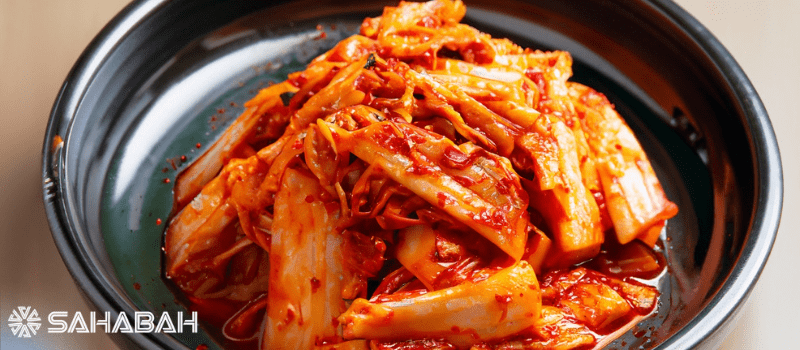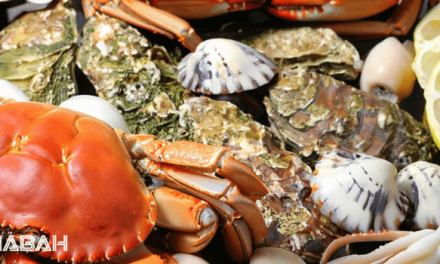Kimchi, the fiery fermented cabbage dish hailing from Korea, has gained international fame in recent years as a healthy probiotic food. Its rising popularity around the world has led many Muslims to wonder if traditional kimchi recipes fall within Islamic halal dietary laws. In examining kimchi through the lens of halal guidelines, we will explore the evidence around traditional kimchi’s permissibility within an Islamic context. We will also provide guidance for Muslims interested in modifying kimchi recipes to suit their halal lifestyles.
Does This Spicy Dish Meet Halal Standards
Kimchi is a spicy, sour fermented cabbage dish that originated in Korea. It has become popular worldwide in recent years, gaining recognition internationally as a nutritious probiotic food. The main ingredients in kimchi are Napa cabbage, salt, garlic, ginger, chili powder, and often fish sauce or shrimp paste.
Kimchi can be made through various fermentation processes, leading to sour and fizzy flavors from lactic acid bacteria. The increasing global popularity of kimchi has led to questions around whether traditional kimchi recipes are considered halal for Muslims who follow Islamic dietary laws.
Some key considerations around kimchi and halal status include:
- The use of fish sauce or shrimp paste as flavoring agents
- Small amounts of alcohol produced during fermentation
- Potential contamination during preparation
Depending on the ingredients, especially the fish sauce, kimchi could be considered haram.
Muslims who wish to enjoy kimchi while adhering to halal dietary rules often wonder:
- Is traditional kimchi made with fish sauce halal?
- Can kimchi be made in a halal way?
This article will analyze the evidence around kimchi’s halal status and provide guidance for Muslims wishing to eat halal kimchi.
Background on Halal Rules
Halal is an Arabic word meaning permissible or lawful. The opposite of halal is haram, meaning unlawful or prohibited.
The Quran provides guidance on what foods are halal and haram. Generally, these halal dietary laws specify:
-
Permitted Meat Sources: Halal animals like cows, sheep, goats, and chickens must be slaughtered according to Islamic procedures. Pork and any pork products are haram.
-
Alcohol Prohibition: Alcoholic drinks and intoxicants are considered haram. This includes alcohol itself as well as food containing alcohol.
-
Contamination Avoidance: Halal foods can be made haram if they come into contact with haram substances. Utensils, machines, and surfaces used to process haram foods can make halal foods haram through contamination.
The criteria that define halal foods are derived from the Quran and Hadith (prophetic traditions). It is obligatory for Muslims to eat only halal foods.
Eating only halal foods is an important part of practicing Islam for observant Muslims. When evaluating if kimchi is halal, these dietary laws provide the framework. Here is a draft of Section III in Markdown format:
Ingredients Of Kimchi Fermented Food
The main ingredients in traditional kimchi are:
- Napa cabbage
- Salt
- Garlic
- Ginger
- Red pepper powder
- Fish sauce or shrimp paste
Kimchi is made of napa cabbage, radish, green onions, red pepper powder, garlic, ginger, fish sauce, and shrimp paste.
The cabbage and other vegetables are salted and soaked to begin the fermentation process. Spices and seasonings are then added for flavor.
The ingredients that have raised most questions around kimchi’s halal status are the fish sauce and shrimp paste.
Fish sauce and shrimp paste are central ingredients in many kimchi recipes, and they are controversial concerning the halal status of kimchi.
These provide important umami flavor but are animal derived. The fermentation process also impacts halal status through alcohol production.
Positions on Kimchi Being Halal Or Haram In Islam
There are arguments on both sides of whether traditional kimchi with fish sauce is halal or haram.
Arguments That Fermented Kimchi Halal
Some reasoning that eating kimchi is permissible for Muslims includes:
-
The main ingredients like cabbage and spices are halal.
-
The amount of alcohol produced through fermentation is negligible.
The percentage of alcohol in kimchi is so low (less than 1%) that it is insignificant.
-
Fish sauce added in small amounts mainly provides flavor and is not intoxicating.
Since fish sauce is added only for flavor and constitutes an insignificant portion of overall content, it does not render the kimchi haram.
Arguments That Kimchi is Haram
Reasons that kimchi may be prohibited include:
-
Any amount of alcohol, even very low percentages, is best avoided.
-
Fish sauce and shellfish are non-halal ingredients.
Most kimchi recipes call for fish sauce or shrimp paste, which are not halal. This renders the dish haram.
-
Potential cross-contamination of equipment with non-halal ingredients can also make kimchi haram.
Ways to Make Kimchi Halal
For Muslims who want to enjoy kimchi while adhering to halal diet, there are some modifications that can be made:
-
Omit fish sauce: Many halal kimchi recipes substitute soy sauce or salt for the fish sauce.
Leaving out fish sauce and using only salt for flavor makes kimchi completely halal.
-
Use non-alcoholic starter culture: Instead of relying on fermentation by wild microbes, a cultured non-alcoholic starter can be used.
Opt for bottled non-alcoholic kimchi seasoning which initiates lactic acid fermentation without alcohol.
-
Source halal-certified fish sauce: Some producers make fish sauce from halal fish and processes.
Muslims should verify the halal status of any fish sauce before using it in kimchi.
-
Wash thoroughly: Cleaning the cabbage thoroughly and using dedicated utensils can help avoid contamination.
With care taken in preparation, kimchi can be made suitable for a halal diet.
Frequently Asked Questions – Is Kimchi Halal
Yes, kimchi is considered halal for Muslims to consume. Kimchi is a traditional Korean side dish made from fermented vegetables, such as cabbage and radish.
What is the fermentation process involved in making kimchi?
The fermentation process of kimchi involves the use of lactic acid bacteria to break down the vegetables, primarily cabbage and radish, and create a sour and tangy flavor. This fermentation process takes place in a controlled environment.
Does kimchi contain alcohol?
Kimchi does undergo fermentation, which naturally produces a small amount of alcohol. However, the alcohol content in kimchi is minimal and not enough to intoxicate or contravene Islamic dietary restrictions. Therefore, kimchi is considered halal.
Is kimchi permissible according to Islamic law?
Yes, kimchi is permissible and considered halal according to Islamic law. Kimchi is a traditional Korean dish that has been consumed by Muslims for many years without any religious objections.
Can Muslims eat kimchi?
Yes, Muslims can eat kimchi without any issue as long as the ingredients used in making kimchi are halal. It’s important to ensure that no non-halal ingredients are added during the preparation process.
Is kimchi halal for Muslims?
Yes, kimchi is halal for Muslims to consume. Muslims can enjoy this flavorful fermented dish as part of their diet.
Are there any concerns about alcohol content in kimchi?
The alcohol content in kimchi is a natural byproduct of the fermentation process. However, the amount of alcohol produced is very small and typically well within the permissible limits outlined by Islamic dietary guidelines.
Is kimchi a part of Islamic dietary recommendations?
While kimchi is not specifically mentioned in Islamic dietary recommendations, it is a culturally significant dish in Korea and does not contain any ingredients that would make it non-halal. Therefore, it can be enjoyed by Muslims as part of a diverse and balanced diet.
Do traditional Korean recipes of kimchi make it halal?
Yes, traditional
Conclusion
In summary, there are good-faith arguments on both sides regarding whether traditional kimchi containing fish sauce is halal or haram.
On one side, the small amounts of alcohol from fermentation and fish sauce primarily added for flavor may be permissible.
Given the tiny alcohol content and use of fish sauce for flavor rather than intoxication, eating kimchi does not seem to violate halal dietary laws.
On the other side, the presence of any non-halal ingredients makes kimchi questionable under strict interpretations.
Traditional kimchi should likely be considered haram due to the combination of fish sauce and alcohol production during fermentation.
For Muslims who want to consume kimchi, removing fish sauce and controlling fermentation are approaches to make kimchi halal. With care and verification of ingredients, kimchi can be incorporated into a halal diet.





